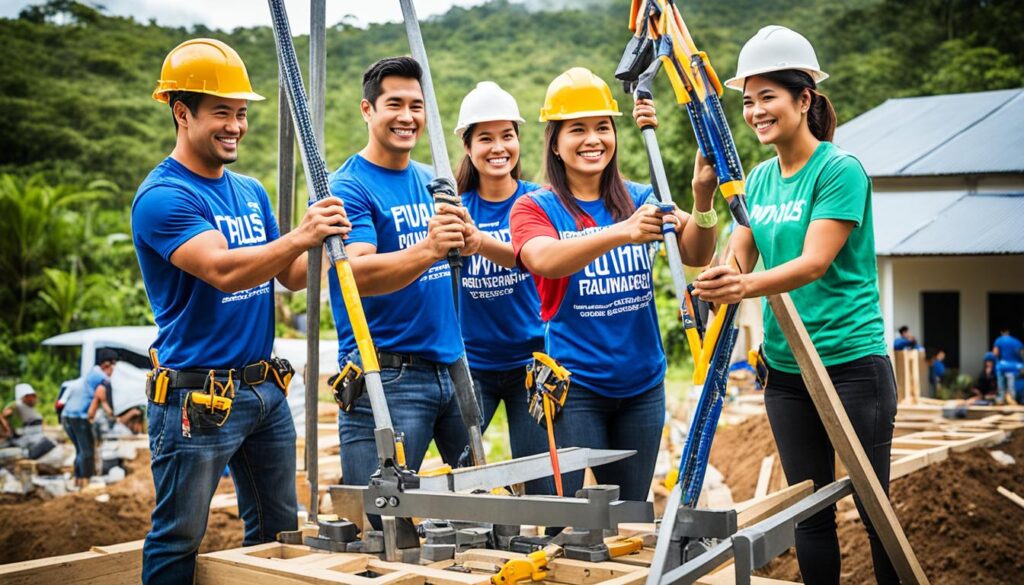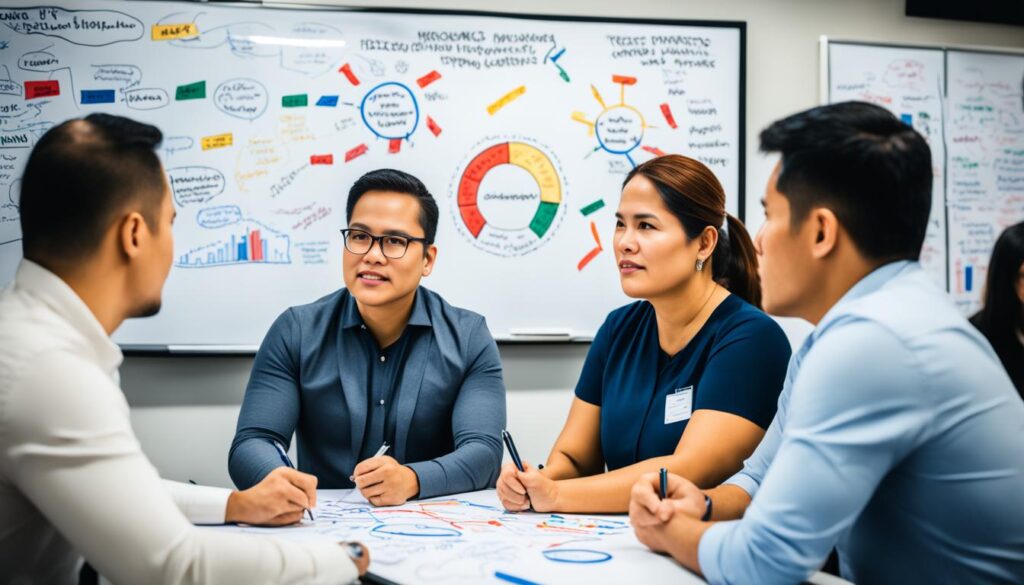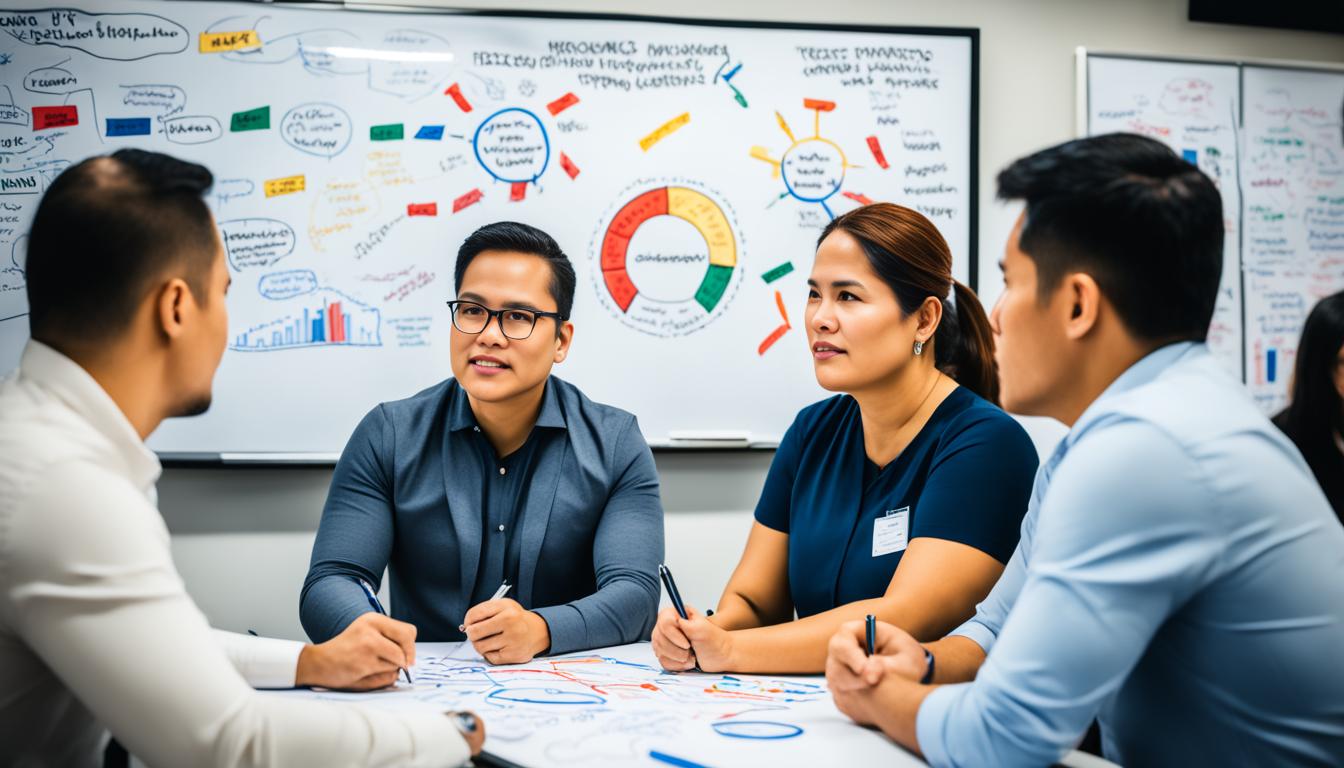Are you looking to unlock the full potential of your teams in the Philippines? Do you want to promote collaboration, communication, and success within your organization? Look no further than effective team training. In this article, we will delve into the importance of team training for team empowerment and development in the Filipino context. Discover how implementing the right strategies can transform your teams and drive them towards excellence.

Key Takeaways:
- Effective team training is crucial for empowering teams in the Philippines.
- Team training fosters collaboration, communication, and high performance.
- Understanding the foundations of team training is essential for success.
- The Filipino workplace dynamics should be considered in team training strategies.
- Building strong professional relationships and personal bonds enhances team cohesion.
Understanding the Foundations of Team Training
The True Meaning of Team and Teamwork
Before delving into the intricacies of team training, it is essential to understand the true meaning of team and teamwork. In its simplest form, a team can be defined as a group of individuals who come together to achieve a common goal. However, it goes beyond mere collaboration. True teamwork entails the seamless integration of diverse skills, perspectives, and efforts, resulting in synergistic outcomes that surpass individual contributions.
Teamwork fosters effective communication, encourages active participation, and promotes a sense of shared responsibility. It creates an environment where each team member feels valued, motivated, and empowered to contribute their best. In the Filipino context, teamwork is deeply rooted in the culture of bayanihan, where unity and cooperation are highly valued.
Characteristics of an Effective Team in the Filipino Context
Effective teams possess certain characteristics that set them apart from merely functional groups. In the Filipino context, these characteristics are shaped by cultural values and norms. An effective team in the Philippines exhibits:
- Open and respectful communication, where each member’s voice is heard and respected.
- Trust and camaraderie, fostering a supportive and collaborative environment.
- Flexibility and adaptability, enabling teams to navigate challenges and seize opportunities.
- Commitment to shared goals and visions, aligning individual aspirations with team objectives.
- Strong work ethic and accountability, ensuring reliability and timely delivery of results.
These characteristics not only contribute to a high-performing team but also reflect the essence of Filipino values of teamwork and unity.
Stages of Team Formation and Its Impact on PH Companies
Every team undergoes a series of stages during its formation, and understanding these stages can provide valuable insights into team dynamics and effectiveness. The stages of team formation are:
- Forming: This stage marks the initial coming together of team members, where roles and expectations are often unclear.
- Storming: In this stage, conflicts and differences may arise as team members vie for their positions and establish their identities.
- Norming: The team begins to establish norms, shared values, and expectations, promoting cooperation and collaboration.
- Performing: At the performing stage, the team operates at its peak, leveraging the strengths of individual members to achieve optimal results.
- Adjourning: In the adjourning stage, the team disbands, completing its mission or transitioning to new objectives.
Understanding these stages allows Philippine companies to effectively manage and support their teams throughout their formation journey, resulting in higher team performance and productivity.

| Definition of Team | Teamwork | Effective Team Characteristics | Team Formation Stages | Filipino Context | |
|---|---|---|---|---|---|
| Meaning | A group of individuals working together towards a common goal. | The collaboration and integration of diverse skills and efforts in pursuit of a shared objective. | Open communication, trust, flexibility, commitment, strong work ethic. | Forming, storming, norming, performing, adjourning. | Reflection of cultural values of teamwork and unity in the Filipino context. |
| Importance | Foundational unit for achieving organizational goals. | Enhances productivity, creativity, and problem-solving abilities. | Drives high performance and collaboration. | Provides insights into team dynamics and facilitates effective management. | Aligns with cultural values and promotes a sense of unity and cooperation. |
| Key Elements | Common goal, shared purpose, role clarity. | Communication, trust, collaboration, shared responsibility. | Respectful communication, camaraderie, flexibility, commitment, accountability. | Role definition, conflict resolution, norm establishment. | Bayanihan spirit, unity, cooperation, shared values. |
Assessing Team Strengths with S.W.O.T. Analysis
One of the most effective tools for assessing team strengths is S.W.O.T. analysis. This analysis helps teams identify their internal strengths and weaknesses, as well as external opportunities and threats. By conducting a thorough S.W.O.T. analysis, teams can gain valuable insights into their capabilities and areas for improvement.

Adapting S.W.O.T. for Filipino Workplace Dynamics
When applying S.W.O.T. analysis in the Filipino workplace, it is crucial to consider the unique dynamics and cultural context. Team strengths assessment should take into account the collaborative nature of Filipino workplace dynamics and the importance of interpersonal relationships. By adapting the S.W.O.T. analysis to fit the Filipino workplace, teams can effectively evaluate their strengths and weaknesses within the specific cultural context.
Resolving Team and Individual Relationship Challenges
Relationship challenges can arise within teams and among individual team members. These challenges can hinder team performance and collaboration. To address these challenges, it is important to foster open communication, encourage active listening, and promote understanding among team members. By implementing strategies to resolve team and individual relationship challenges, teams can strengthen their bonds and enhance overall team dynamics.
| Challenge | Solution |
|---|---|
| Team Relationship Challenges | – Promote open and honest communication – Encourage team-building activities – Foster a culture of respect and collaboration |
| Individual Relationship Challenges | – Encourage active listening – Provide opportunities for team members to share perspectives – Offer conflict resolution strategies |
Maximizing Performance by Honing Team Skills
In order to achieve optimal team performance, it is essential to prioritize skill development and performance enhancement. By honing team skills, organizations can unlock their team’s full potential and drive success. In this section, we will explore various team skills that can be developed through training and provide strategies for enhancing team performance.
One of the key aspects to consider when focusing on team performance is effective communication. Clear and open communication channels enable team members to collaborate efficiently, share ideas, and address any conflicts that may arise. By providing training specifically geared towards improving communication skills, teams can foster stronger relationships and achieve greater productivity.
Another essential skill for team performance is effective problem-solving. By equipping team members with problem-solving techniques and strategies, organizations empower their teams to overcome obstacles and find innovative solutions. Problem-solving training encourages critical thinking and the ability to work through challenges together, leading to improved performance.
“When team members have a clear understanding of their roles and responsibilities, it enhances their overall performance and enables them to work towards a common goal.”
Furthermore, developing leadership skills within the team can significantly impact overall performance. Strong leaders inspire and motivate their team members, foster a positive work environment, and ensure that everyone is working towards a shared vision. Leadership training programs can help team members unlock their leadership potential and contribute to the team’s success.
It is also important to focus on fostering a culture of collaboration and teamwork. By implementing team-building activities and exercises, organizations can strengthen the bonds between team members and improve overall cohesion. These activities promote trust, respect, and effective collaboration, which are essential for high-performing teams.
Lastly, continuous skill development is crucial for long-term success. Encouraging team members to engage in ongoing professional development programs and providing resources for skill enhancement will not only benefit individual growth but also contribute to the team’s overall performance. By investing in skill development, organizations demonstrate their commitment to their team’s success.
Strategies for Enhancing Team Performance
| Strategy | Description |
|---|---|
| Communication Training | Equip team members with effective communication skills to foster collaboration and address conflicts. |
| Problem-Solving Techniques | Provide problem-solving training to enhance critical thinking and creativity in finding solutions. |
| Leadership Development | Empower team members with leadership skills to inspire and motivate the team towards shared goals. |
| Team-Building Activities | Implement team-building exercises to foster trust, respect, and effective collaboration. |
| Continuous Skill Development | Encourage ongoing professional development programs to enhance individual and team skills. |
By implementing these strategies, organizations can hone team skills, enhance team performance, and ultimately achieve greater success in their endeavors.
The Role of Corporate Alignment in Team Efficiency
In order to achieve optimal team efficiency, it is crucial for organizations to prioritize corporate alignment. When team goals are aligned with the broader organizational goals, it sets the stage for increased productivity, effectiveness, and overall success. Corporate alignment ensures that every team member is working towards a common purpose and contributing to the organization’s strategic objectives.
By aligning team goals with organizational goals, companies can create a sense of unity and purpose among team members. This fosters a collaborative environment where individuals understand how their efforts contribute to the larger picture. When everyone is working towards the same organizational goals, it promotes cohesion and synergy within the team.
Organizations that prioritize corporate alignment also benefit from improved communication and coordination. When team members are aligned with the broader organizational goals, they can effectively communicate their progress, challenges, and needs. This enables leaders to provide the necessary support and resources to ensure that teams are operating efficiently.
Furthermore, corporate alignment enhances decision-making processes within teams. When team members are aligned with the organizational goals, they can make informed decisions that are in line with the overall strategic direction. This reduces the likelihood of conflicting priorities and ensures that every decision contributes to the achievement of organizational goals.
Implementing corporate alignment requires clear communication of organizational goals, regular performance evaluations, and ongoing feedback channels. It is important for leaders to consistently communicate the vision, mission, and objectives of the organization to ensure that team members are well-informed and aligned with the organizational goals.

In conclusion, corporate alignment plays a crucial role in enhancing team efficiency. By aligning team goals with organizational goals, companies can create a unified and purpose-driven workforce. This leads to improved productivity, communication, decision-making, and overall team effectiveness.
Nurturing a Culture of Feedback and Expectation Management
Creating a feedback culture within teams is crucial for fostering team development and ensuring individual growth. In the context of Filipino SMEs, where collaboration and effective communication are key, feedback plays a vital role in enhancing team performance. By implementing expectation management strategies and promoting active listening, organizations can create an environment that encourages open and honest feedback, leading to improved team dynamics and productivity.
Importance of Feedback for Team Development in Filipino SMEs
Feedback is an invaluable tool for team development, especially in Filipino SMEs. It allows team members to provide constructive criticism, highlight strengths, and identify areas for improvement. By promoting a feedback culture, organizations can empower their teams to take ownership of their work, learn from mistakes, and continuously grow. This culture of feedback fosters a supportive and collaborative environment, where everyone feels valued and their contributions are acknowledged.
Feedback also facilitates professional growth by providing individuals with valuable insights and perspectives from their peers. It helps team members gain a better understanding of their strengths and weaknesses, enabling them to maximize their potential. Moreover, constructive feedback enhances communication and trust within teams, leading to stronger relationships and increased productivity.
The Art of Setting Expectations and Active Listening
Setting clear expectations is essential for effective team training and development. When team members have a clear understanding of their roles, responsibilities, and goals, they can align their efforts and work together towards a common objective. Expectation management ensures that everyone knows what is expected of them, reducing confusion and conflicts.
Active listening is another crucial aspect of effective team training. It involves attentively hearing and understanding others’ viewpoints, concerns, and feedback. By actively listening, team members demonstrate respect, empathy, and openness, fostering an environment where everyone feels comfortable sharing their thoughts and ideas. Active listening also promotes effective communication, collaboration, and conflict resolution.
Embedding the art of setting expectations and active listening in team training programs helps cultivate a culture of trust, respect, and transparency. It creates an environment where individuals feel comfortable providing feedback and expressing their expectations, leading to better teamwork, improved problem-solving, and increased overall team performance.

Building a strong feedback culture and implementing effective expectation management techniques requires continuous effort and commitment from both leaders and team members. It is an ongoing process that should be regularly reinforced through communication, training programs, and team activities. By nurturing a culture of feedback and expectation management, Filipino SMEs can unlock the full potential of their teams and drive sustainable growth.
Encouraging Professional Relationships and Personal Bonds
In order to foster a strong and united team, it is crucial to encourage and nurture professional relationships and personal bonds among team members. These connections play a vital role in building team cohesion and promoting effective collaboration. When team members have strong relationships and bonds, they are more likely to trust and support each other, resulting in a higher level of teamwork and overall productivity.
One way to encourage professional relationships is through team-building activities that allow team members to interact, communicate, and get to know each other on a personal level. These activities could include team lunches, off-site outings, or even virtual team-building exercises. By providing opportunities for team members to socialize and bond outside of work, it helps create a sense of camaraderie and deeper connections among team members, which can greatly enhance collaboration.
Additionally, fostering personal bonds within the team can greatly contribute to team cohesion. Encouraging team members to share personal interests, hobbies, or life experiences can help create a more inclusive and supportive team environment. This can be done through icebreaker exercises, team sharing sessions, or designated time for team members to connect and have meaningful conversations outside of work-related topics.
By prioritizing the development of professional relationships and personal bonds, organizations can create a positive and engaging work culture that values collaboration and teamwork. When team members feel connected and invested in each other’s success, they are more motivated to work together towards common goals, resulting in improved team performance and overall success.
Implementing Strategic Leadership for High-Performance Teams
In order to foster high-performance teams, strategic leadership plays a crucial role in providing guidance and direction. By implementing effective strategic leadership practices, teams can maximize their potential and achieve outstanding results. In this section, we will explore the utilization of the TORI model and other frameworks in PH teams and provide best practices for developing and enhancing team cohesion.
Utilizing the TORI Model and Other Frameworks in PH Teams
One effective approach to strategic leadership is the utilization of the TORI model. TORI, which stands for Task, Opportunity, Roles, and Interpersonal Relationships, provides a comprehensive framework for leaders to assess and develop their teams. By incorporating the TORI model into team training programs, leaders can ensure that their teams have a clear understanding of their tasks, identify opportunities for growth, define roles and responsibilities, and foster positive interpersonal relationships.
In addition to the TORI model, there are various other frameworks and models that can be utilized in PH teams to enhance strategic leadership. These frameworks provide structured approaches to decision-making, problem-solving, and team development. By leveraging these frameworks, leaders can create a cohesive and high-performing team culture.
Best Practices to Develop and Enhance Team Cohesion
Developing and enhancing team cohesion is essential for creating a high-performance team. Here are some best practices to promote team cohesion:
- Establish a shared vision and goals: By aligning team members around a common purpose and set of objectives, leaders can foster team cohesion and a sense of unity.
- Promote open communication: Encourage team members to openly communicate their ideas, opinions, and concerns. This helps build trust and strengthens relationships within the team.
- Encourage collaboration: Foster a collaborative environment where team members work together towards shared goals. Collaboration promotes synergy and leverages the diverse skills and expertise of team members.
- Recognize and appreciate team members: Acknowledge and appreciate the contributions of individual team members. Recognizing their efforts boosts morale and motivates them to continue performing at their best.
- Provide continuous learning and development opportunities: Invest in ongoing training and development programs to enhance team members’ skills and knowledge. This not only improves team performance but also demonstrates the organization’s commitment to their growth.
By implementing these best practices, leaders can strengthen team cohesion, nurture a positive team culture, and drive high performance.
Tailoring Programs for the Filipino Workforce
When it comes to team training programs, one size does not fit all. In order to truly empower the Filipino workforce, it is essential to design training programs that are tailored to their specific needs and cultural context. By taking into account the unique characteristics and values of the Filipino workforce, organizations can ensure that their training initiatives are effective and impactful.
Cultural context plays a crucial role in team training programs. It is important to acknowledge and respect the cultural nuances of the Filipino workforce in order to create a positive learning environment.
Customized training programs that are culturally relevant can help foster a sense of belonging and engagement among team members. By incorporating Filipino values, traditions, and communication styles, organizations can create training experiences that resonate with the workforce on a deeper level.
“By understanding the cultural context of the Filipino workforce, organizations can create training programs that address their specific needs and challenges. This leads to increased effectiveness and better results,”.
Furthermore, the customization of training programs allows organizations to address the unique challenges and opportunities that exist within the Filipino workforce. For example, team training programs can focus on developing skills that are highly valued in the local market or tackle specific cultural barriers that may hinder collaboration and communication.
It is also important to recognize that the Filipino workforce is diverse, with individuals from various backgrounds and experiences. By offering training programs that cater to different learning styles and preferences, organizations can ensure that every team member has the opportunity to grow and excel.
Overall, tailoring team training programs for the Filipino workforce is crucial for maximizing their potential and achieving success. By recognizing and embracing the cultural context, organizations can design customized training initiatives that empower teams to thrive in their workplace.
Conclusion
In conclusion, effective team training is essential for empowering teams and promoting their development. By investing in training programs that cater to the needs of the Filipino workforce, organizations can unlock the full potential of their teams. Through team training, teams can enhance their skills, collaborate more effectively, and achieve higher levels of performance.
The benefits of team training extend beyond individual team members to the overall success of organizations. Empowered teams are more motivated, engaged, and aligned with organizational goals, leading to increased productivity and innovation. Moreover, team training fosters a culture of continuous learning and improvement, enabling teams to adapt and thrive in an ever-evolving business landscape.
To implement successful team training strategies in the Philippines, it is crucial to consider the unique characteristics of the Filipino workforce and workplace dynamics. Customized training programs that emphasize feedback culture, relationship building, and strategic leadership can optimize team performance and cohesion.
As organizations prioritize team training, they will experience the transformative impact of empowered teams. By investing in effective training strategies, organizations can cultivate a culture of collaboration, nurture talent, and drive sustainable growth. In this way, team training becomes the cornerstone of success in the dynamic and competitive business landscape of the Philippines.
FAQ
What is the importance of team training?
Team training is crucial for empowering teams to collaborate, communicate, and perform at their best. It contributes to team development and success by enhancing skills, building strong relationships, and aligning team goals with organizational goals.
What are the foundations of team training?
The foundations of team training involve understanding the true meaning of team and teamwork, the characteristics of an effective team in the Filipino context, and the stages of team formation and their impact on companies in the Philippines.
How can S.W.O.T. analysis be used to assess team strengths?
S.W.O.T. analysis is a useful tool for assessing team strengths. It involves identifying the team’s strengths, weaknesses, opportunities, and threats. Adapting S.W.O.T. analysis to fit the dynamics of the Filipino workplace is important, as well as resolving relationship challenges within teams and among individual team members.
What team skills can be developed through training?
Various team skills can be developed through training, including communication, problem-solving, decision-making, leadership, and conflict resolution. These skills enhance team performance and effectiveness.
How does corporate alignment enhance team efficiency?
Corporate alignment involves aligning team goals with organizational goals. When teams are aligned with the overall mission and vision of the organization, it leads to increased productivity and effectiveness.
Why is feedback and expectation management important?
Feedback and expectation management contribute to team development and success. In Filipino SMEs, feedback plays a vital role in enhancing team performance. Setting clear expectations and practicing active listening are essential components of effective team training.
How do professional relationships and personal bonds contribute to team cohesion?
Building strong professional relationships and personal bonds among team members fosters team cohesion and effective collaboration. It creates a supportive and trusting work environment.
What is the role of strategic leadership in fostering high-performance teams?
Strategic leadership is crucial for developing high-performance teams. The utilization of frameworks like the TORI model and implementing best practices for team cohesion are key to achieving success.
Why is it important to tailor team training programs for the Filipino workforce?
Tailoring team training programs to fit the needs of the Filipino workforce ensures that they are culturally relevant and aligned with the unique characteristics of the workforce. Customized training programs are more effective in achieving desired outcomes.
What are the key insights and takeaways from this article?
The key takeaway is the importance of empowering teams through effective team training. It contributes to team development, enhances performance, and leads to overall success. Implementing successful team training strategies in the Philippines involves understanding the foundations, assessing team strengths, developing team skills, fostering feedback culture, nurturing relationships, implementing strategic leadership, and tailoring programs to the Filipino workforce.

Leave a Reply